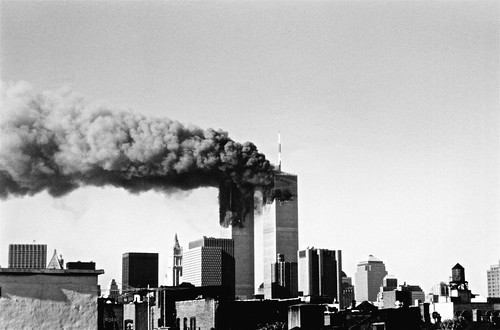Last week Susan Keyloun reviewed “nine/twelve tapes,” a play that reenacted man-on-the-street interviews conducted in the days following September 11, 2001. Now The Local has acquired clips from the tapes, which you can listen to for the first time below. Collin Daniels, 40, had been living in New York City for just three months when the World Trade Center attacks occurred – he had moved here along with eight other Ohio University theater-program graduates, and was working a temp job in publishing. “I was feeling out of place and alienated,” said Mr. Daniels over the telephone today, “and when 9/11 happened, it heightened my sense that I didn’t belong to this city yet and I wanted to do something to heal and process this.”
Inspired by a recent experience with the Laramie Project – in which interviews with Laramie, Wyoming townspeople in the wake of Matthew Shepard’s death were turned into a play – Mr. Daniels and his friends took to the streets to interview New Yorkers, starting with a candlelight vigil on September 12. “Every time I put the mic on someone who wanted to talk, it was amazing because I suddenly realized they really needed to talk,” said Mr. Daniels. “It wasn’t me just trying to create this historical record for a play.”
Mr. Daniels and his colleagues didn’t end up producing the play – he moved back to Cincinnati in 2002 and returned to New York in 2004 with a new focus on starting a music career. About a year ago, however, an Ohio University classmate, Shannon Michael Wamser (co-founder of Stages on the Sound) asked to use the material, and “nine/twelve tapes” was born. Below, Mr. Daniels tells us about the clips.
Mickey
Mickey was the first guy we talked to when we got to West 4th Street and Sixth Avenue on September 12. He was in his fifties, and had an American flag. He was the unofficial leader of the group cheering the rescue workers. This is a human being who has been traumatized in a really unique way and he’s trying to make sense of it and offer help to other people, but he doesn’t know how to do that.
Tanya
I was at Bellevue, where there were over 100 to 150 flyers on a wall with candles and flowers at the base. In my historical preservation journalist role, I thought I would read the names of everyone into the microphone so that in the play there would be a section where we would read 10 or 15. I couldn’t do it – I started crying on the fifth one as it started to hit me, and by the time I got to 10 or 12 I couldn’t talk. Tanya came up to me because she thought I needed comforting. She said she was a nurse – before a recent career shift, she had worked in some sort of capacity for a financial company very high up in towers, so she knew a bunch of people that had been killed. She had one of the many stories along the lines of, “What if you hadn’t left…”
Brian
Brian is an extroverted, tall playwright and filmmaker who loves to tell stories. It was strange because as soon as 9/11 happened, his whole personality shifted. He really wasn’t talking to anybody. I asked to interview him and he snapped at me and said, “I don’t want anything to do with the project.” Either Thursday or Friday night, he came up to me and said, out of the blue, “Get your tape recorder out.” He went through with me what he went through on Tuesday. It turned out he had had this almost cinematic journey where he was on the F train heading into Manhattan. When he was above ground, he saw the first tower on fire. When he went underground, he decided to get a disposable camera to take a photo of what he thought was just a fire, but it ended up being this severely traumatic experience for him. That was the first interview where I started to see that for some people, this is actually therapy. He was so much more at ease after he did that interview. It was night and day.
Rob
Rob was from I’m assuming New Jersey or Long Island and he was a sales rep at the publishing company that I was temping at. He was in Charlotte, North Carolina on the day of 9/11 and he had a really tough time getting back – I think they ended up having to sweet-talk some guy at Avis and he and this other guy drove two and a half days to get back to the city. Once everyone was back at the temp job on Thursday or Friday, he told the story of his day. When he told it, I was laughing. It was bizarre because when 9/11 happened, there was no joke that could get you to smile. Rob’s story was the first time I had laughed.




